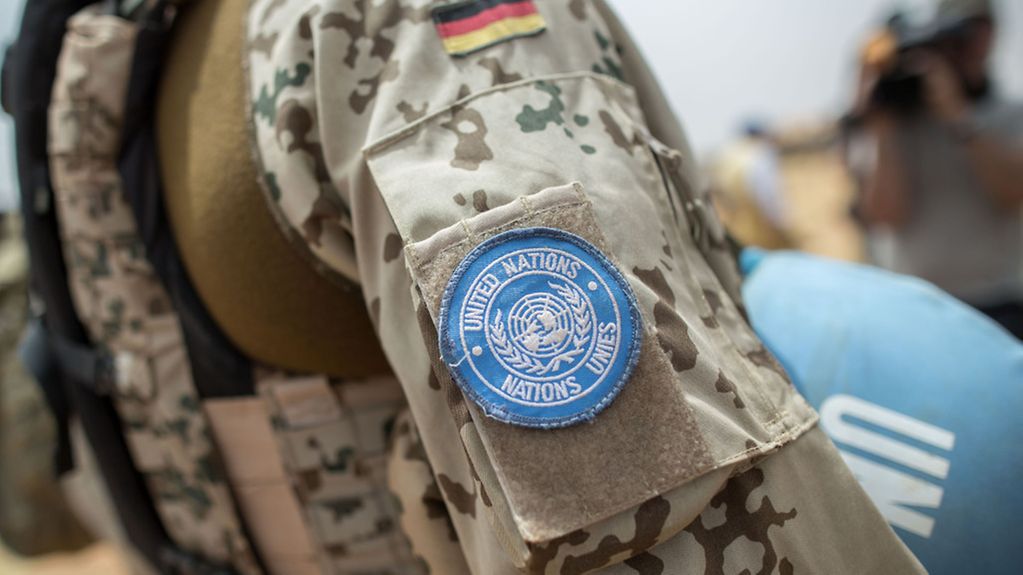Bundeswehr foreign missions
In future Germany is to step up its support for the United Nations Multidimensional Integrated Stabilization Mission in Mali (MINUSMA). As of February it will be possible to deploy up to 1,000 soldiers within the scope of the stabilisation mission.
3 min reading time

In future more German troops can be deployed as part of the UN mission in Mali
Photo: Michael Kappeler/dpa
The German Bundestag has also approved the extension of the mandate until the end of January 2018.
The United Nations Multidimensional Integrated Stabilization Mission in Mali (MINUSMA) aims to stabilise Mali, because developments in Mali have an impact on the situation in the wider Sahel region, in Libya and in neighbouring states in the region. The Bundeswehr has been supporting the mission since 2013.
The current mandate for MINUSMA has been extended by one year. The existing ceiling on troops of 650 will be raised to 1,000 as of February 2017. The German Bundestag has approved the government motion.
Additional helicopters
In future the German government will deploy additional transport and combat helicopters in Mali, but not before March 2017 and for a limited period. The first helicopters will be transferred at the weekend. With this, Germany will close a gap that has arisen because of the withdrawal of Dutch helicopters. A lack of helicopters would have jeopardised the performance capacity of the mission. Germany’s contribution will help retain and improve the efficacy of the mission.
Bundeswehr contribution to date
Germany will also continue the military contribution it has made to date to MINUSMA. This includes the deployment of German personnel in the staff units of the mission, and the provision of liaison officers. The Bundeswehr is also providing tactical air transport capabilities and helping with mid-air refuelling. With this, the Bundeswehr is supporting French forces on the ground, which are authorised by UN Security Council resolutions.
The Bundeswehr has also deployed a larger mixed reconnaissance company and forces to protect specific sites. To this must be added support forces in the fields of command support, logistics and the medical service.
Stability in Mali prevents migration
Germany also has an interest in effective stabilisation in Mali. Terrorism, crime and poverty can have major impacts on Europe too in the medium term. That is particularly true of the north of Mali, which is a major transit region for African migrants.
In addition to the German military contribution, the German government is working in the Sahel region to fight the structural causes of displacement. During a visit to Mali in October 2016, Chancellor Angela Merkel spoke with Mali’s President Ibrahim Boubacar Keita about what is known as a migration compact. The aim is to generate prospects of a good future in the country. A good education and better training could enable many young people to develop their own country in future, rather than leaving it.
Mission monitors ceasefire
One of the core tasks of the UN mission is to support ceasefire agreements and confidence-building measures between the parties to the conflict. It is also to foster the national political dialogue and national reconciliation.
The parties to the conflict in Mali signed an inner-Malian peace agreement on 15 May and 20 June 2015. It is intended to usher in a comprehensive peace process. The implementation of the agreement is crucial for sustainable peace, especially in the north of the country.
Building the security sector
The peace process already launched is still being hampered by terrorists and armed groups that are close to the terrorists. The safety and security of the people of the north of Mali is seriously affected by terrorism and crime. Mali’s armed forces do not yet have the capabilities they need to address these challenges.
To protect people, the authority of the government must be restored throughout the country. That is why it is important to develop Mali’s security sector.
Further support for the peace process
In addition to the military components, MINUSMA has a civilian component. Here too Germany is involved. Up to 20 German police officers can be assigned to the mission; 14 officers are currently in Mali.
Germany is also supporting the peace process through its extensive development cooperation and political support. In addition, the German government is financing crisis prevention measures and providing humanitarian assistance.